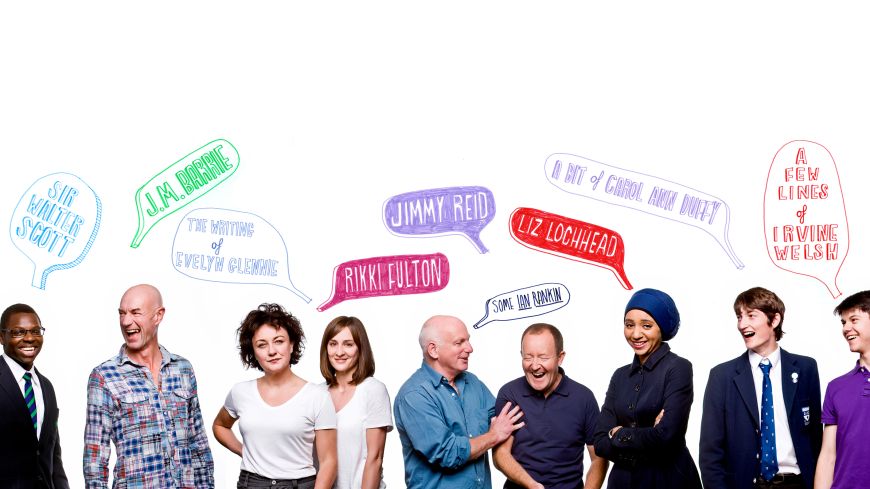
From midday to midnight on the day before Scotland’s Referendum on Independence, The National Theatre of Scotland hosted a live twelve-hour celebration of Scottish music and spoken word written by Scots and read, sung and performed by artists, actors, politicians, journalists, sportspeople, singers and scientists.
In a relaxed and informal setting the assembled band of artists who were sitting on stage introduced themselves without surnames. This intimate spirit echoed a time when aunties and uncles did ‘a wee turn’ in the living room at family get-togethers; times that had been nostalgically recalled by Graham McLaren, the National Theatre of Scotland Associate Director who conceived and curated this unique show.
The emotional tone of the day was set when Scotland’s Makar Liz Lochhead movingly read Burns’ internationalist poem A Man’s a Man for a’ that that had been sung at the opening of the Scottish Parliament in 1999. As the show proceeded, and each ‘wee turn’ got up to the mic, the audience was entertained and enlightened in equal measure. Revelations about 18th century radical visionary Fanny Wright came from writer and actor Gerda Stevenson and the astonishing Law of the Innocents made in the year 697 by the Abbot of Iona was revealed by screenwriter Paul Laverty.
A range of poems from MacDiarmid’s Scotland Small?; Sorley MacLean’s Hallaig, Jackie Kay’s Old Tongue and Edwin Morgan’s Open the Doors were voiced with honest emotion. Alan Spence spoke of “enlightened common sense” as he read from his wonderful book of haiku Glasgow Zen.
The warmth and camaraderie that was tangible in this session was in no small part due to the self -styled “Marxist version of Still Game”, former Upper Clyde Shipbuilders activists Tom Brotherstone and Jimmy Cloughley. In a braw double act, they read the speeches of Jimmy Reid and Jimmy Airlie from the 1971 work in. A rousing rendition of Hamish Henderson’s John MacLean March from folk singer Arthur Johnstone further buoyed the mood. MacLean featured again through folk singer Jimmie McGregor’s reminiscing on their (and my own) home town of Springburn and its lost railway industry and Douglas Henshall’s powerful reading of MacLean’s speech from the dock in 1918. His presence was there in the reading of part of Hamish Henderson’s anthem Freedom Come all Ye, as he features in the lines ‘When MacLean meets wi his freens in Springburn, aa the roses an geans will turn tae bloom’.
While the general sentiment of this first session favoured the YES side, it was peppered with ambivalence in some pieces like David McLelland’s If Scotland and the metaphor for parting and of Alan Breck and David Balfour in Stevenson’s Kidnapped, respectively read by Juliet Cadzow and Joyce McMillan.
The four 2 ½ hour sessions that made up Blabbermouth may be as Tam Brotherston succinctly put it “as much politics as your erse can stand”. Blabbermouth 1 is all that is being reported on here. Among their fine repertoire on the first session from the Blabbermouth house band, made up of well-known Scottish musicians Annie Grace, Neil McDermott, Cat Myers, Karine Polwart, Inge Thomson and Sarah Hayes & Joe Rattray of Admiral Fallow, was a lovely version of the Waterboys’ Whole of the Moon . Let’s hope that’s what we are all capable of seeing in time to come.

